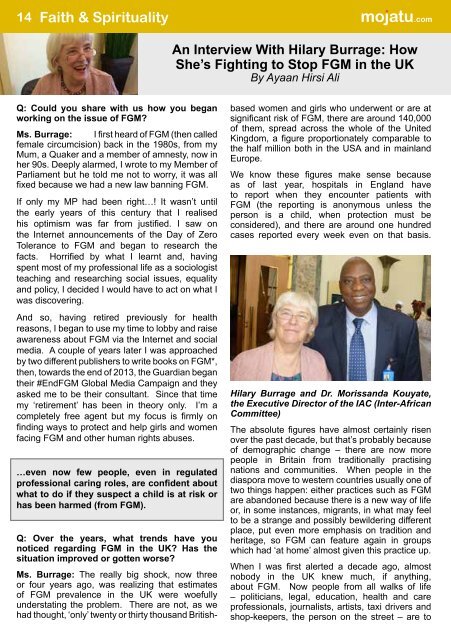Mojatu Berkshire Magazine Issue B011
Create successful ePaper yourself
Turn your PDF publications into a flip-book with our unique Google optimized e-Paper software.
14<br />
Faith & Spirituality<br />
mojatu.com<br />
An Interview With Hilary Burrage: How<br />
She’s Fighting to Stop FGM in the UK<br />
By Ayaan Hirsi Ali<br />
Q: Could you share with us how you began<br />
working on the issue of FGM?<br />
Ms. Burrage: I first heard of FGM (then called<br />
female circumcision) back in the 1980s, from my<br />
Mum, a Quaker and a member of amnesty, now in<br />
her 90s. Deeply alarmed, I wrote to my Member of<br />
Parliament but he told me not to worry, it was all<br />
fixed because we had a new law banning FGM.<br />
If only my MP had been right…! It wasn’t until<br />
the early years of this century that I realised<br />
his optimism was far from justified. I saw on<br />
the Internet announcements of the Day of Zero<br />
Tolerance to FGM and began to research the<br />
facts. Horrified by what I learnt and, having<br />
spent most of my professional life as a sociologist<br />
teaching and researching social issues, equality<br />
and policy, I decided I would have to act on what I<br />
was discovering.<br />
And so, having retired previously for health<br />
reasons, I began to use my time to lobby and raise<br />
awareness about FGM via the Internet and social<br />
media. A couple of years later I was approached<br />
by two different publishers to write books on FGM*,<br />
then, towards the end of 2013, the Guardian began<br />
their #EndFGM Global Media Campaign and they<br />
asked me to be their consultant. Since that time<br />
my ‘retirement’ has been in theory only. I’m a<br />
completely free agent but my focus is firmly on<br />
finding ways to protect and help girls and women<br />
facing FGM and other human rights abuses.<br />
…even now few people, even in regulated<br />
professional caring roles, are confident about<br />
what to do if they suspect a child is at risk or<br />
has been harmed (from FGM).<br />
Q: Over the years, what trends have you<br />
noticed regarding FGM in the UK? Has the<br />
situation improved or gotten worse?<br />
Ms. Burrage: The really big shock, now three<br />
or four years ago, was realizing that estimates<br />
of FGM prevalence in the UK were woefully<br />
understating the problem. There are not, as we<br />
had thought, ‘only’ twenty or thirty thousand Britishbased<br />
women and girls who underwent or are at<br />
significant risk of FGM, there are around 140,000<br />
of them, spread across the whole of the United<br />
Kingdom, a figure proportionately comparable to<br />
the half million both in the USA and in mainland<br />
Europe.<br />
We know these figures make sense because<br />
as of last year, hospitals in England have<br />
to report when they encounter patients with<br />
FGM (the reporting is anonymous unless the<br />
person is a child, when protection must be<br />
considered), and there are around one hundred<br />
cases reported every week even on that basis.<br />
Hilary Burrage and Dr. Morissanda Kouyate,<br />
the Executive Director of the IAC (Inter-African<br />
Committee)<br />
The absolute figures have almost certainly risen<br />
over the past decade, but that’s probably because<br />
of demographic change – there are now more<br />
people in Britain from traditionally practising<br />
nations and communities. When people in the<br />
diaspora move to western countries usually one of<br />
two things happen: either practices such as FGM<br />
are abandoned because there is a new way of life<br />
or, in some instances, migrants, in what may feel<br />
to be a strange and possibly bewildering different<br />
place, put even more emphasis on tradition and<br />
heritage, so FGM can feature again in groups<br />
which had ‘at home’ almost given this practice up.<br />
When I was first alerted a decade ago, almost<br />
nobody in the UK knew much, if anything,<br />
about FGM. Now people from all walks of life<br />
– politicians, legal, education, health and care<br />
professionals, journalists, artists, taxi drivers and<br />
shop-keepers, the person on the street – are to


